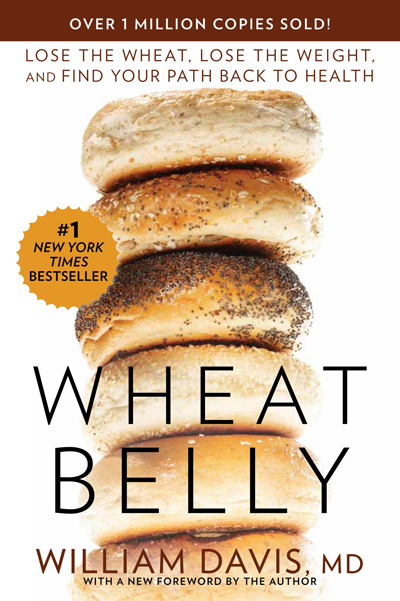It’s easy to forget just how big of a presence wheat has in the American diet. Pizza, pasta, cakes, buns, tortillas and sandwich bread, along with a plethora of other foods we include in our daily diet, are constantly being thrown into our mouths, munched away without a second thought.
Maybe you’ve attempted to cut back on the bready carbs or the infamous gluten/gliadin proteins a few times. In today’s age, many have found it to be an extremely difficult and frustrating process.
But, why? Why is so hard to give up our fruity breakfast cereals and warm dinner rolls? Is it because of the inconvenience (understandably so) or could it also be that consumers have developed an actual addiction to wheat over the years? The verdict is for you to decide.
 One of the biggest, most well known players in the controversial debate is Dr. William Davis, a cardiologist and the author of the New York Times Bestseller “Wheat Belly.” He argues that the wheat we so casually consume every day is in fact an opiate, highly addictive and overpowering. This is because, while “high” on wheat, our appetites increases via gliadin, a protein that has been genetically modified over the years in order to produce higher crop yields.
One of the biggest, most well known players in the controversial debate is Dr. William Davis, a cardiologist and the author of the New York Times Bestseller “Wheat Belly.” He argues that the wheat we so casually consume every day is in fact an opiate, highly addictive and overpowering. This is because, while “high” on wheat, our appetites increases via gliadin, a protein that has been genetically modified over the years in order to produce higher crop yields.
After several hours without wheat, just as if you were on heroin, you desperately seek more “hits” of crackers, bagels and bready foods. The vicious, never-ending cycle commences: you crave, you eat and you crave again until your waistline meets a concerning size. Those who quit can experience withdrawal syndrome, including harsh fatigue, mental “fog” and lack of motivation can last for several days or weeks.
On the opposing team, Dr. John McDougall, an advocate for plant based diets and co-author of “The Starch Solution,” calls bluff on Davis’ claims. No doubt, wheat is often the villain behind the sudden dropping and skyrocketing of sugar/insulin levels that encourages simple carb-munchers to crave more. But to put wheat on the same level as heroin? Do gluten and gliadin really have that much power over us?
In 1979, The Journal of Biological Chemistry concluded that the exorphins (opioids that are produced outside of the body that can attach to opiate receptors) derived from the two wheat proteins must be absorbed into the bloodstream, fully intact, in order to interact with our opiodergic system – a biological process that helps our bodies deal with stress and identify behavior that is relatively in our best interest. Alcohol, cocaine, tobacco and even exercise all interact with this system to generate addiction. Another Wheat Belly skeptic and elite endurance athlete, Mark Sission, plunged into research in search of whether or not wheat met these requirements. His findings were inconclusive. Simulations of the human gut have shown that wheat does in fact produce exorphins, which do have potential of crossing over into our bloodstream. Additionally, some physicians have tried opiate blockers on their patients who struggle to give up wheat and were met with great success, suggesting a connection between digested wheat and the opiodergic system. Then again, it could just be the classic placebo effect. Out of all the ambiguity though, it is certain that those affected are typically living with Celiac Disease, or some other form of condition that severely compromises the intestinal lining.
Alright, but what about the average Joe and his healthy, normal gut? Is he then guaranteed protection against exorphins entering his bloodstream? No one truly knows. The research isn’t there to make a definitive answer and, at this point in time, it’s up to you in determining whether or not you are a bona fide wheat addict. Though if you know you have a weak intestinal lining, it is suggested you tread a bit lightly and limit your wheat intake. In the event you do want to give up wheat altogether, keep in mind the other forces at play that may be making the transition tough for you: the inconvenience, the stress of deviating from cultural norms (such as no longer eating your traditional family dish) or the struggle to find new forms of comfort (no more donut runs after a breakup). If it feels like bread runs your life than I suggest taking small baby steps in eliminating these outside pressures or triggers, rather than sitting back, popping a few opiate blockers and blaming it all on your biology. There’s a lot more to addiction than science. Discipline and true grit can take you far and no doubt deliver you to a wheat free lifestyle. No Bread Eaters Anonymous required.




